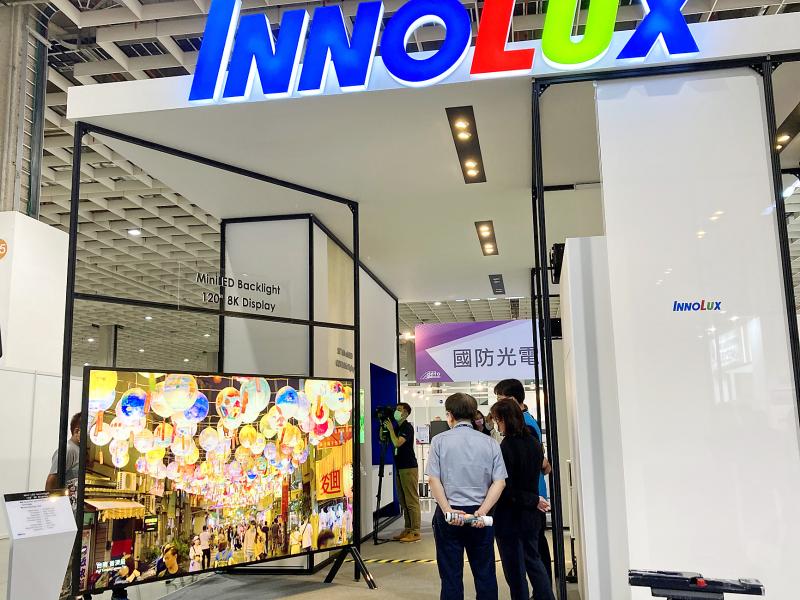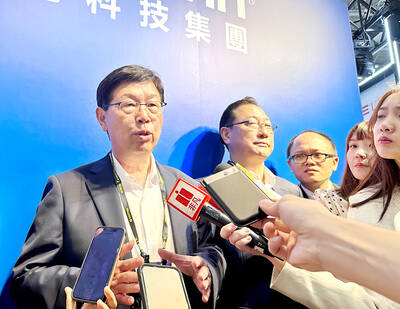LCD panel maker Innolux Corp (群創) yesterday said it is bullish about panel demand over next 12 months as the COVID-19 pandemic continues to drive demand for notebook computers, tablets and TVs.
The Miaoli County-based company said that the pandemic has boosted demand for electronic devices as workers and students increasingly work and study remotely, leading to strong revenue growth and portending a profitable quarter for the panel maker.
Innolux has posted losses for the past seven quarters.

Photo: Lisa Wang, Taipei Times
“Our competitors have said that strong orders will extend through December, and even to the first quarter of next year, but we are confident to say that our business outlook is even better than that,” company chairman Jim Hung (洪進揚) told a media briefing in Taipei.
“We believe that the stay-at-home economy will drive a sustainable growth, even during the post-pandemic era,” Hung said. “We are bullish about our business outlook. For the whole of next year, demand will not be a problem.”
Laptops, tablets, TVs and other devices benefit from this wave of demand, Hung said.
As a result, the industry is in a healthy condition due to balanced demand and supply for LCD panels as Samsung Electronics Co phases out panel production, he said.
The prices of 55-inch TV panels jumped 6.9 percent per unit this month from the prior month due to tight supply, while panels for notebook computers climbed 3.2 percent, TrendForce Corp (集邦科技) data released on Tuesday showed.
This quarter, prices of large flat panels would surge 10 percent from the previous quarter, TrendForce said, adding that supply crunch of driver integrated circuits used in displays and chips poses a problem for shipments of certain panels.
Innolux would try to satisfy demand primarily for panels used in information technology applications, Innolux vice president James Yang (楊柱祥) said.
Innolux yesterday unveiled its first flat-panel satellite antenna in collaboration with Kymeta Corp, which has received funds from Microsoft Corp founder Bill Gates and other investors.
Innolux said it has assumed shipments to US customers of the antennas, which can be installed on aircraft, vehicles or boats to access the Internet through a satellite connection.
The new product is crucial for Innolux, allowing it to rejuvenate older and less advanced fabs to produce new products, said Ting Chin-lung (丁景隆), head of Innolux’s technology development center.
The company expects large-scale adoption of its antennas within the next five years.
Innolux said that demand would increase gradually after Space Exploration Technologies (SpaceX), founded by Tesla Inc chief executive Elon Musk, by the end of this year assumes providing Internet connectivity services through the company’s low Earth orbit satellites.
Facebook Inc and Amazon.com Inc are also building their own low Earth satellite networks, indicating a significant growth potential for the technology, Ting said.

Taiwan Transport and Storage Corp (TTS, 台灣通運倉儲) yesterday unveiled its first electric tractor unit — manufactured by Volvo Trucks — in a ceremony in Taipei, and said the unit would soon be used to transport cement produced by Taiwan Cement Corp (TCC, 台灣水泥). Both TTS and TCC belong to TCC International Holdings Ltd (台泥國際集團). With the electric tractor unit, the Taipei-based cement firm would become the first in Taiwan to use electric vehicles to transport construction materials. TTS chairman Koo Kung-yi (辜公怡), Volvo Trucks vice president of sales and marketing Johan Selven, TCC president Roman Cheng (程耀輝) and Taikoo Motors Group

Among the rows of vibrators, rubber torsos and leather harnesses at a Chinese sex toys exhibition in Shanghai this weekend, the beginnings of an artificial intelligence (AI)-driven shift in the industry quietly pulsed. China manufactures about 70 percent of the world’s sex toys, most of it the “hardware” on display at the fair — whether that be technicolor tentacled dildos or hyper-realistic personalized silicone dolls. Yet smart toys have been rising in popularity for some time. Many major European and US brands already offer tech-enhanced products that can enable long-distance love, monitor well-being and even bring people one step closer to

RECORD-BREAKING: TSMC’s net profit last quarter beat market expectations by expanding 8.9% and it was the best first-quarter profit in the chipmaker’s history Taiwan Semiconductor Manufacturing Co (TSMC, 台積電), which counts Nvidia Corp as a key customer, yesterday said that artificial intelligence (AI) server chip revenue is set to more than double this year from last year amid rising demand. The chipmaker expects the growth momentum to continue in the next five years with an annual compound growth rate of 50 percent, TSMC chief executive officer C.C. Wei (魏哲家) told investors yesterday. By 2028, AI chips’ contribution to revenue would climb to about 20 percent from a percentage in the low teens, Wei said. “Almost all the AI innovators are working with TSMC to address the

FUTURE PLANS: Although the electric vehicle market is getting more competitive, Hon Hai would stick to its goal of seizing a 5 percent share globally, Young Liu said Hon Hai Precision Industry Co (鴻海精密), a major iPhone assembler and supplier of artificial intelligence (AI) servers powered by Nvidia Corp’s chips, yesterday said it has introduced a rotating chief executive structure as part of the company’s efforts to cultivate future leaders and to enhance corporate governance. The 50-year-old contract electronics maker reported sizable revenue of NT$6.16 trillion (US$189.67 billion) last year. Hon Hai, also known as Foxconn Technology Group (富士康科技集團), has been under the control of one man almost since its inception. A rotating CEO system is a rarity among Taiwanese businesses. Hon Hai has given leaders of the company’s six